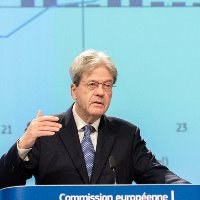(BRUSSELS) – Inflation and energy prices are expected to hold back growth in the European economy, which is reaching pre-pandemic levels of GDP, according to the EU’s winter economic forecast Thursday.
“Multiple headwinds have chilled Europe’s economy this winter: the swift spread of Omicron, a further rise in inflation driven by soaring energy prices and persistent supply-chain disruptions,” said Economy Commissioner Paolo Gentiloni: ” With these headwinds expected to fade progressively, we project growth to pick up speed again already this spring.”
The Winter 2022 Economic Forecast projects that, following notable expansion by 5.3% in 2021, the EU economy will grow by 4.0% in 2022 and 2.8% in 2023. Growth in the euro area is also expected at 4.0% in 2022, moderating to 2.7% in 2023. The EU as a whole reached its pre-pandemic level of GDP in the third quarter of 2021 and all Member States are projected to have passed this milestone by the end of 2022.
After the robust rebound in economic activity that started in spring last year and continued through early autumn, growth momentum in the EU is estimated to have slowed to 0.4% in the last quarter of 2021, from 2.2% in the previous quarter. While a slowdown was expected, it was sharper than projected, with the surge in COVID-19 infections, high energy prices and continued supply-side disruptions.
Growth continues to be shaped by the pandemic, with many EU countries under pressure from a combination of increased strain on healthcare systems and staff shortages due to illness, precautionary quarantines or care duties. Logistic and supply bottlenecks, including shortages of semiconductors and some metal commodities, are also set to keep weighing on production, at least throughout the first half of the year.
Energy prices are also now expected to remain elevated for longer than expected in the EU’s Autumn Forecast, exerting higher inflationary pressures and a more protracted drag on the economy.
The forecast assumes that the strain on the economy caused by the current wave of infections will be short lived. Economic activity is set to regain traction, also as supply conditions normalise and inflationary pressures moderate. Looking beyond the short-term turbulence, the fundamentals underpinning this expansionary phase continue to be strong. A continuously improving labour market, high household savings, still favourable financing conditions, and the full deployment of the Recovery and Resilience Facility (RRF) are all set to sustain a prolonged and robust expansionary phase.
Focusing on inflation, the forecast has been considerably revised upwards compared to the Autumn Forecast. This reflects the effects of high energy prices, but also the broadening of inflationary pressures on other categories of goods since autumn.
After reaching a record rate of 4.6% in the fourth quarter of last year, inflation in the euro area is projected to peak at 4.8% in the first quarter of 2022 and remain above 3% until the third quarter of the year. As the pressures from supply constraints and high energy prices fade, inflation is expected to decline to 2.1% in the final quarter of the year, before moving below the European Central Bank’s 2% target throughout 2023.
Overall, inflation in the euro area is forecast to increase from 2.6% in 2021 (2.9% in the EU) to 3.5% (3.9% EU) in 2022, before declining to 1.7% (1.9% EU) in 2023.
The forecast warns that ongoing containment measures as a result of Covid and protracted staff shortages could drag on economic activity. They could also dent the functioning of critical supply chains for longer than expected. By contrast, weaker demand growth in the near-term may help to resolve supply bottlenecks somewhat earlier than assumed.
On the upside, household demand could grow more strongly than expected, as already experienced with the reopening of economies in 2020, and investments fostered by the RRF could generate a stronger impulse to activity.
Inflation may turn out higher than expected if cost pressures are eventually passed on from producer to consumer prices to a larger extent than projected, amplifying the risk of second-round effects.
Risks to the growth and inflation outlook are markedly aggravated by geopolitical tensions in Eastern Europe.



